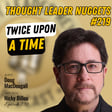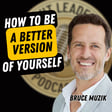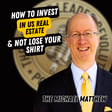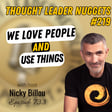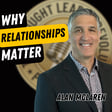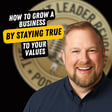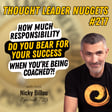Exploring Human Potential and Workplace Challenges
00:00:03
Speaker
became fascinated in what makes us who we are and how we can shift out of pain and suffering. I was equally interested in how people navigate through very significant challenges, what those impacts are when you're in the world of work. Because I understood as a child growing up in this environment, all the ripple effects
00:00:27
Speaker
for an adult in the working world of not feeling like they're performing to their true potential, they're not able to provide for their family in the way they want to, et cetera. And I saw up close all the fallout from that, including people who had once achieved great heights.
00:00:44
Speaker
and suddenly they found themselves on the outs.
Defining Desires and Seizing Opportunities
00:00:49
Speaker
Let's refocus on you defining what you want and you selecting yourself and you presenting yourself for opportunities that make you want to jump up and be excited and get out of bed in the morning.
Introduction to Thought Leader Revolution with Nikki Ballou
00:01:07
Speaker
Welcome to the Thought Leader Revolution with Nikki Ballou. Join the revolution. There's never been a better time in history to speak your truth, find your freedom, and make your fortune. Each week, we interview the world's top thought leaders and learn the secrets of how they built a six to seven figure practice. This episode has been brought to you by eCircleAcademy.com, the proven system to add six to seven figures a year to your thought leader practice.
00:01:38
Speaker
Welcome to another exciting episode of the podcast, the Thought Leader Revolution. I'm your host, Nikki Malou. And boy, do we have an exciting guest lined up for you today. Today's guest is
Courtney's Journey from Education to Business
00:01:50
Speaker
a dear friend of mine. She's my sister from another mister. She also happens to be one of the world's leading thought leaders, helping folks who aren't
00:02:01
Speaker
senior executives in professional situations who have kind of plateaued, who are kind of not making progress the way that they want to, and she helps them transform and transcend all that and live their best life within their corporate career. I am speaking, of course, of no other than the one, the only,
00:02:23
Speaker
The legendary Courtney Inter-Simona. Welcome to the show, Courtney. Hey, Mickey. Thank you so much for having me. It's great to be here. It's great to have you here. So, Courtney, I know you super well. I know how awesome you are. But my listener doesn't yet know how awesome you are. So tell us your backstory. How'd you get to be the great Courtney Inter-Simona?
00:02:47
Speaker
That's a great question. No. So my backstory is I grew up, don't worry, I'm not going to give you every last detail, but I grew up the child of two teachers. And there's a reason why I'm sharing that. But I grew up the child of two teachers, both of whom were Ivy League graduates. And there was a huge respect for learning and ideas in my household.
00:03:15
Speaker
And the reason I mentioned this is that I did not grow up in a house of business people, right? It was not on my radar that I was going to be working in a large corporate organization, or frankly, that I was going to ever own my own business.
00:03:35
Speaker
And what I was focused on growing up was the love of learning, which I still carry with me to this day, and being of service to other people. And that piece around service was also very much born of
00:03:55
Speaker
what I observed happening in my family, and particularly to people that I care deeply about, starting with my father, who is a brilliant man, wonderful, full of life, great athlete, great looking guy, super smart, first in his family to go to college, went to Princeton, didn't even know really what it was before he landed there. And also deeply scarred by severe struggles with bipolar disorder.
00:04:26
Speaker
I bring that up to say that I think from a very young age, I became fascinated in what makes us who we are.
Impact of Personal Challenges on Career Focus
00:04:40
Speaker
how we can shift out of pain and suffering. Now, my dad was basically functioning more or less fine all my years growing up. Thankfully, he was maintained. His challenges with mental health were largely addressed through medications and what have you. But there were reverberating effects of that, which directly impacted his sense of self and his professional life.
00:05:11
Speaker
Another thing that was going on for him, even irrespective of some of those challenges, was as a teacher, he was loved. He was an English teacher, always got the best ratings. However, he was in a shrinking school district in every year.
00:05:27
Speaker
come end of the school year, his role would be eliminated because the school district didn't know if they were going to have another opportunity come the fall. And it was a last in, first out. It wasn't about how well you did, right? It wasn't a meritocracy. Now, inevitably, he would end up being rehired right around Labor Day. But you can imagine this was a very distressing experience
00:05:50
Speaker
And also, although he knew it had nothing to do with his skills and abilities, it was created a significant amount of self-doubt, regardless of that knowledge, and a feeling of a lack of
00:06:11
Speaker
a lack of worthiness, right? And he valiantly moved through that as best he could, right? And he went on to do other things, including owning a restaurant and, you know, in fact, becoming a counselor later in his life and, you know, touching a lot of people very positively. But the point is on my backstory, this is what I came from. And I was, you know, like I said before, equally interested in
00:06:39
Speaker
how people navigate through very significant challenges, what those impacts are when you're in the world of work. And I wanted to bring those two things together and see how I could aid other people on their journey, because I understood as a child growing up in this environment, how
00:07:03
Speaker
all the ripple effects for an adult in the working world of not feeling like they're performing to their true potential. They're not able to provide for their family in the way they want to, et cetera. So roll the clock on. And I got a master's degree in psychology. And I thought I was going to go on and be a therapist. But I realized that where I really wanted to be was in the context of work in the business world. And the most likely thing for me to do, at least as far as I saw it at that
00:07:33
Speaker
point was to move into human resources, which I did, and I took a job on Wall Street,
Lessons from Wall Street HR Experience
00:07:38
Speaker
which was the last place on earth I thought you would ever find me. But nonetheless, the opportunity appeared and I took it. And I got, among other things, a real education along the way on how people's careers evolve and how
00:07:58
Speaker
Many people who on paper who are extremely talented and they had all the right credentials would only get so far and then often they would fizzle out. And then there were people who had perhaps lesser seeming credentials and the right schools and all that kind of thing.
00:08:19
Speaker
and didn't even graduate from college, which is completely fine. And they would go on to the C-suite. And I just became really interested in what makes the difference here. And that put me on this path of pursuing the answer to that question. And along the way, I was also growing as a leader. And I had no immediate model to follow in my household.
00:08:50
Speaker
And so I just went on a multi-year journey of self-discovery. I hired my own coaches along the way and talked and learned and observed from those around me. And part of my role within the human resources function was to serve as an advisor to leaders and help them upskill their capabilities. But my role was also around
00:09:17
Speaker
helping leaders make decisions about who was going to get promoted, why they were going to get promoted, who was going to perhaps be demoted, if you will, or layered in an organizational restructuring.
Reinventing Careers After Setbacks
00:09:30
Speaker
I saw up close all the fallout from that, including people who had once achieved great heights.
00:09:37
Speaker
And suddenly, the deck chairs moved, and they found themselves without a sponsor, and they found themselves on the outs. And they couldn't explain it to themselves, many of whom crashed and burned, such that they never really recovered from that. And it was so unnecessary.
00:10:04
Speaker
I also in this witnessed people who took a tumble.
00:10:12
Speaker
who were once shining stars, but then, for one reason or another, were no longer viewed as having the potential for the next level. Maybe there was a change in leadership above them. They were no longer the select chosen few. And I saw some who were impacted by that, who, yes, had a large wobble, but then were able to reinvent themselves.
00:10:41
Speaker
And I studied closely what made it possible for those people to go on and reinvent themselves. And this is all channeled into, after 26 years on the inside doing this, this has all led to me starting my own coaching practice, where I'm specifically targeting, working with those high achieving corporate leaders
Helping Leaders Rediscover Potential
00:11:11
Speaker
who find themselves in a plateau and whether they came to that plateau in their ascension gradually or as is more often the case, it was an abrupt halt that's inexplicable to them because the rules that they were playing by that seemed to get them regular promotions and other kinds of recognition and reward seem to no longer be working. I'm focusing on helping those people
00:11:40
Speaker
get their mojo back because there's nothing more painful than losing that, not knowing why, and feeling like your most productive years are behind you prematurely.
00:12:04
Speaker
So that's basically my whole story. I'm happy to elaborate on any of those pieces and share some stories of people that I've worked with in this regard to illuminate those points. But where would you like to take this?
Strategies for Overcoming Career Wobbles
00:12:19
Speaker
That was a lot. So let me unpack a couple of items that I think are
00:12:26
Speaker
really powerful and germane. So I really like that phrase, the large wobble. And I like the other phrase, get your mojo back. So I really think those are powerful and ought to be, if they're not already part of your branding and messaging. So the large career wobble, to me, that's a point worth exploring further and maybe with a story. And the other one is, how do you get your mojo back when you have been a success
00:12:54
Speaker
and then you're stuck in the career wobble. Because the career wobble is like a zone that a lot of people get stuck in. Yeah. I mean, I remember being in corporate where I was in a career wobble a couple of times. And the way I got unstuck was to go work somewhere else. Wasn't able to do it at the same company that I was in. And I just would love for you to maybe get deeper into the what is a career wobble and maybe give us a story around that. Yeah, sure.
00:13:24
Speaker
So one particular story comes to mind in this moment.
Case Study: Bob's Career Reinvention
00:13:31
Speaker
A colleague who I worked with will call him Bob.
00:13:38
Speaker
Bob was in a role as the chief branding officer as part of the larger marketing organization within a Fortune 200 financial services firm. He's in a very senior role. He was also about 58 years old, and that is relevant here because of some of his concerns rightly placed around age discrimination.
00:14:03
Speaker
Prior to that role, he had a very
00:14:12
Speaker
I can't find the word I want to use here. Luminous, it's not quite the right word, but he was a well-recognized figure in the marketing sphere within financial services, and he had worked at a different organization prior, also in a very high-level role. He was extremely well-regarded, invited to be a judge at exclusive events in his industry and so forth. Anyway.
00:14:42
Speaker
And then illustrious career, and he was doing great. And then, and in fact, he was hired into our organization away from this other place by a person who was a relatively new chief marketing officer at this organization. And then that person who brought him in, the chief marketing officer, fell out of favor with a new CEO.
00:15:12
Speaker
She left. He was exposed. In that, not that he suddenly changed and he wasn't good, but he didn't have that person there advocating for him when he wasn't in the room. Fine. A new person comes into the role. And here's the kicker. The new person who comes in as the chief marketing officer used to work for this guy, used to work for Bob.
00:15:39
Speaker
So now we have that switch thing, you're working for the person who used to work for you.
00:15:44
Speaker
And suddenly, he's not being invited to certain meetings that he should be at anymore. He's kind of finding himself out of the loop on things. And roll the clock on, and the long story short is, he gets told about six months later that, you know, Bob, you're great, this and that, but we're going to have to eliminate your position. We're going to restructure, you know, the department, and it's nothing about you, but, you know, your role is going away.
00:16:14
Speaker
So here he is 58. He was riding high for a really long time. He hasn't changed anything about his approach. So why should things suddenly be different? Why is he on the outs? And now he's got to start a job search. And he was really shaken by this. Couldn't, you know,
00:16:37
Speaker
couldn't understand quite what had gone wrong. What should he have been doing differently? And now he was plagued by the concern that, you know, I've got a head full of white hair.
00:16:51
Speaker
I otherwise look vital, but let's be honest, there's a lot of discrimination out there and I'm nowhere near ready to retire. I feel just as enthusiastic about leading teams and defining award-winning campaigns as I ever did, but who's going to hire me now? Right?
00:17:16
Speaker
I wouldn't say desperation in terms of he wasn't going to be going on the bread line anytime soon, but it wasn't about the money. It was about, I want to still contribute. I want to still be able to make an impact. And I feel like completely out of control about what happened here.
Grieving and Recognizing Accomplishments
00:17:34
Speaker
And even though they told me that the reason my role was eliminated had nothing to do with me or my skills,
00:17:42
Speaker
I'm wondering if that was just a polite way to let me down. Maybe there was something wrong. So the wobble became, can I ever get back to who I was? What happened to that person? What am I not projecting out into the world to have that recognized and taken advantage of?
00:18:06
Speaker
And also maybe I should just pack it in because I'm almost 60 and who's going to hire me kind of thing. So we came to be working together.
00:18:22
Speaker
I think the first thing that I have people focus on, and this might sound counterintuitive, but is to allow themselves to feel the feelings that they're having. I'm not a believer in let's just jump in and pretend that this doesn't hurt or isn't painful, but we put a time boundary on that.
00:18:46
Speaker
How much time do you want to spend licking your wounds? It's okay to do that. And then when you're ready, we're going to move forward full force and put you back in connection with who the hell you really are. And he was ready to move forward on that within a week. He did not want to continue in a place of feeling sorry for himself.
00:19:16
Speaker
And so then we focused on reconnecting him to all of the accomplishments, all of the achievements, all of the incredible things that he's done in his life. And at the same time, getting his focus off of why did this thing change over here? I don't know that you can, you know, I'm gesturing, but to forget all of that. And let's refocus on you defining what you want,
00:19:45
Speaker
And you selecting yourself and you presenting yourself for opportunities that make you want to jump up and be excited and get out of bed in the morning, as opposed to coming from a frame of, is anyone going to want me?
00:20:03
Speaker
Let's put this back into what do you want? What are you going to contribute? What value are you going to bring? How are you going to solve problems? Focus on that and get your head out of this. They didn't want me anymore. Maybe they didn't. Who cares? There's a lot of other they's out there. This reminds me of a story that I saw recently of Meryl Streep, the famous
00:20:31
Speaker
Oscar-winning actress who was talking about how she was once rejected because she was told she wasn't pretty enough for some role. And, you know, that's a hurtful thing. And what she said to the person was, well, that's fine, but that's one opinion. Yours is one opinion of many opinions.
00:20:52
Speaker
And I'm going to keep going forward. And as she notes, she's acquired 18 Oscars. And I share that story afterwards. And I share that story a lot with my clients because it goes to the point that I'm making.
Success Story: Landing a Better Job
00:21:08
Speaker
Not everyone is going to love you. Things may change. But what hasn't changed is your core value in what you bring to the table. And cultivating your own self-belief in that is the first and fundamental thing that's going to help you transcend the wobble.
00:21:28
Speaker
There's a lot of tactics I use to do that with folks, but that's the first thing. Then, of course, we got into the tactics of what's your story, what's your narrative, what's your brand positioning, all that good stuff, tactical things around resume, heavy emphasis on networking and leveraging relationships of which he had many.
00:21:50
Speaker
And again, focusing on how can I, Bob, take all of my incredible gifts and share them with the world to solve problems that need to be solved out there and having conversations about that and not feeling like you're going around hat in hand asking people to give you a job. That's not what this is about. And so I was able to shift, help him rather, to shift his stance, his come from.
00:22:19
Speaker
And to make a long story longer, I'm very pleased to say that he landed a job that ended up paying him. And he was already earning probably about half a mil a year level type of earner. He got another opportunity as a chief brand officer for a premier large Fortune 100 brand earning
00:22:49
Speaker
couple hundred thousand, I would say, more than he was earning before. And we keep in touch, and he loves it. And it's a much better culture. And he's appreciated, and life is great again. And he turned 60, and he's living his best life.
00:23:08
Speaker
So, I don't want to use this story to make it seem like it was all a straight line. But the point was, what is your decision about what your future is going to be? And are you letting someone else outside of you decide? Or are you going to decide what it is and then go after it?
00:23:33
Speaker
And along that path to get you back in the mindset where you really have the level of self belief that you need in order to accomplish that. And in order to live that way, we've got to remind you of the truth of who you are. I want to just unpack a bit of what you said here because there's some good things in here as well. So you're talking about Bob.
00:24:00
Speaker
had an illustrious career, was recruited away from his existing firm to come to a new firm. The fellow who recruited him was on the outs.
00:24:10
Speaker
And that happens, right? The person who hired for it does get out of favor. They get fired. That happens. And when a new team comes in, what's normal is that whoever was associated with the old person is not going to necessarily be looked at like, hey, we want to keep you. They're going to look at you and go, I think I want to replace you with someone I know from my background and whatnot, which is normal.
00:24:37
Speaker
I think that's powerful because there's a lot of people in senior roles that have probably gone through this. Oh, yeah. Self-doubt, 100%. They don't want me. There's a level of rejection there. It's like you asked out the pretty girl to the prom and she said, no, she went out with your best friend instead. It hurts. What does he have that I don't have? That kind of stuff goes through.
00:25:03
Speaker
What I think was powerful here is that you brought almost the energy of a big sister or a mom to Bob and said, hey, you're still a good dude, man. You're still okay. And let's take stock of who you really are rather than what these people who didn't
00:25:21
Speaker
and weren't even going to give you a chance have to say about it because their desire to bring in their own confidence has nothing to do with your worth. Skill. Yeah, exactly. And then you brought your secret sauce of how to go about tactically to go get a job. And the result was he landed a job that paid him 40% more, 200K more than what he was making before.
00:25:46
Speaker
I think that's fantastic. So, you know, the pain here for Bob was the person who hired him was no longer there, so his sponsor was no longer there, and he lost his job. That's a real pain. I get it. That's powerful. That's a real hobby. And with the added element of having it be at the hands of his former subordinate,
00:26:15
Speaker
Yeah, his Fordham is subordinate. So that person probably had some issues and went on a bit of a power. Maybe, maybe, I don't even, you know, maybe, but even if it wasn't true, it was more the symbolism of it, you know, and especially combined with his fears about age, which again are understandable. I mean, that's, that's part of the
00:26:38
Speaker
society we still live in. And she was younger and she's sort of like the new sheriff in town. And I don't think she had any particular animus towards him. They had previously had a great working relationship and he felt it was still okay. He wasn't...
00:26:54
Speaker
He was like a layer, you know, there was another manager in between the two of them, but she represented the new regime coming in who wanted their hand selected people. And this happens, you know, all the time. And I just want to inject one other piece. Yeah, I just want to inject one other piece here and I want to like hijack the rest of the conversation.
Meritocracy Myths and Self-Worth
00:27:24
Speaker
This touches on another challenge that I see many high achievers come up against at one point or another. And it's this unwillingness or this somewhat naive trust in the notion that life and particularly in the work professional sphere is a meritocracy.
00:27:51
Speaker
i.e., if I study hard and I get the grade on the test, you know, I get promoted to the next grade or, you know, whatever. I get the award. I get the recognition. And that is just not reality. But what's fascinating to see is how some individuals, irrespective of the quantity of years of experience, life in the fast land they've had,
00:28:18
Speaker
Some of them still cling on to this paradigm and then it becomes something that they then turn against themselves. What do I mean by that? Well, if it's a meritocracy and if I get pushed out, that means by definition, I wasn't good enough. Versus when you start to understand that, again, particularly at the more
00:28:45
Speaker
the closer you get to the C-suite, let's put it in those terms, that of course you've got to bring it, you've got to have the skills capabilities, but that alone is not what's going to keep you in the game. And it's not in and of itself what's going to get you moving ever higher. And if you recognize that and you recognize that
00:29:10
Speaker
as part of the mix. There's musical chairs. There's constant change. People want to bring in their own people like it's much more tribal. We're talking about humans fundamentally, right? Then you can gain the perspective to know that it doesn't mean that you should feel good about the fact necessarily that you lost your role, but you don't have to make it mean that you don't have value to offer.
00:29:38
Speaker
That's pretty brilliant actually, you know one of america's most respected presidents was president john f. Kennedy and His one of his most famous quotes was life isn't fair And that's a fact and most people don't get that they don't understand that they want life to be fair And it isn't right it's uh
00:30:03
Speaker
Sometimes you put yourself in situations where other human beings are involved. And if those other human beings make decisions, sometimes those decisions are going to go in your favor and sometimes they're not. One of my favorite writers is Robert Greene, who wrote The 48 Laws of Power, among other books.
00:30:31
Speaker
Robert Greene has helped me understand in a way that's become abundantly clear to me that when you're dealing with human beings,
00:30:41
Speaker
there are dynamics that you need to understand and those dynamics have very little to do with what's right, what's just, what's fair and have everything to do with that person's self-concept about themselves. So if there's someone who has deep insecurities and you're someone who's very confident and you show them you're very confident and you work for them,
00:31:05
Speaker
That might not go so well for you, because their deep insecurities are going to be bothered by your confidence. And he has some very unique and sometimes cynical approaches that he recommends you take in those situations. But I think there's some truth to what he's saying. And your client, Bob,
00:31:27
Speaker
Even though he's 58, even though he had a lot of life experience, there's a part of him that had remained very young within, and he expected fairness, he expected meritocracy, he expected the good work that he did to be recognized. He had a rude awakening, but thankfully he had you to guide him through the landmine infested waters that he found himself in,
00:31:54
Speaker
and he was able to lend in a better situation. So I think that's a wonderful thing. And this story that you told us is very powerful in that respect. Sorry, go ahead.
00:32:04
Speaker
No, sorry, myself. I just wanted to connect it back to, not that it was my job to save my dad, right? We can go down that rabbit hole. But just like it wasn't my dad's fault or because of a lack in capacity or ability.
00:32:26
Speaker
that led his job to being, as they use the phrase, excessed. What a terrible word, right? But I don't know what's worse, displaced, excessed, right? Because the school district was shrinking.
00:32:41
Speaker
Even though on a logical, rational, intellectual level, he could understand that, and we could even say maybe Bob understood it, the emotional reverberations that tie back to things that we internalized from really, really young about the way the world is supposed to work,
00:33:03
Speaker
nipped at his heels and in this example nipped at Bob such that it risked fully turning them over and turning against themselves.
00:33:16
Speaker
Yeah, I just, again, I don't see myself as out here saving the world and I'm not the hero
Role of Coaching in Recovery
00:33:22
Speaker
here. And Bob got the job he got because of who he is and how he showed up, but he did the work. But what was vital and what I saw when he came to me with this story, when we first started working together was, I'm not going to let you go down that hole.
00:33:43
Speaker
You know what I mean? We've got to nip this in the bud right now. We've got to get you clear on exactly what happened here and what it means, and be very careful about what you're making it mean. Because what you're making it mean, initially, is I suck. That's not what it means. You know what I mean? So anyway, I'm just super, super passionate about it because, as I said, I've seen
00:34:11
Speaker
what gets left in the wake of not turning that wobble around in terms of, you know, you talk about someone's self-concept and all the things that flow from that. So, yeah.
00:34:28
Speaker
Listen to you and tell Bob's story. A few things come to mind for me, Courtney, and I want to have a further discussion with you about this offline around your thought leadership because I think this is an important revelation for me. That's why I'm really glad we're having this conversation.
00:34:44
Speaker
First of all, what happened to Bob at his age, at his tenure position within an organization is something that happens all the time to very senior people in all kinds of organizations.
00:34:59
Speaker
I would imagine there are hundreds, if not thousands, maybe even tens of thousands of individuals over the age of 55, senior, senior within an organization to find themselves on the outs and find it difficult because of their own self-concept, the wobble that they felt, the lack of belief that it awakens in them, and they don't recover from that. And I believe that you can be a hero to them because you can show them that that late career wobble does not need to be fatal.
00:35:28
Speaker
You know, so that might not be a bad title for this episode. Your late career wobble doesn't have to be fatal, right? Absolutely. Absolutely. So I'm going to write that down. But the other thing that hits me from your thought leadership point of view is that you have a path out for these people and that path depends more than anything
00:35:58
Speaker
on them having a good human being in their corner who believes in them. You know, we talk about this inside of our work together is that most good people
00:36:11
Speaker
go through rough times and they just need somebody to tell them it's gonna be okay, you're great, this is temporary. Just so that temporary dispelling of their self-concept and belief doesn't end up becoming permanent. All they need is someone like you to be there for a period of time until the wobble self-corrects itself and their belief comes back up and then they take all the actions they need to take.
00:36:38
Speaker
You see in our group as an example, we've had a few people lately that have joined us. There's this lovely lady Pamela, right? And she's older than you and I. And she was feeling a little blue because she hadn't gotten a client in a while and blah, blah, blah.
00:36:52
Speaker
And I got to tell you, I see just putting a little belief into Pamela. Look at look at this woman. She's on fire, man. She's she's selling. I mean, I commented in our group today. She's my role model.
00:37:10
Speaker
I'm 75. Damn straight! I want to be Pamela now! Am I? Yeah, right. Exactly. Exactly. No, completely, completely. All that took for Pamela was for me to pour a little bit of self-belief in her, for Teresa and Mark to do the same, and she woke up. And it strikes me, Courtney, that within your branding and your messaging,
00:37:34
Speaker
this, you ought to be speaking to these late courier wobble folks, senior folks, and it should all be about, Hey, did this wobble happen to you? And if it did,
00:37:47
Speaker
Are you starting to doubt yourself? Are you starting to believe that it's too late? You're not ready to retire, but it's too late for you to recapture your glory and go back on that trajectory of success. Because if that's your belief, I'm here to tell you, Balderdash, we're going to fix it for you. Not only is it not real that this is it, you're done.
00:38:14
Speaker
your best days are yet ahead of you, another of America's most respected and greatest president. In fact, my favorite American president of all time is Ronald Reagan. And Ronald Reagan said about America, when he got elected in 1980, a lot of Americans were starting to believe Jimmy Carter, who said, you know, there's a malaise, America, this is it, it's not going to get much better. And Reagan said, Balderdash, America is a shining city.
00:38:39
Speaker
whose best days are still ahead of her. And he made the American people believe. I study presidency as a leadership, because I'm fascinated by leadership, right? That's amazing, yeah. I don't know if you knew this, but of the last, say, until Kennedy, from Kennedy till today, there's only one president that left office way more popular than he came in. You know who that was? Reagan. Reagan?
00:39:09
Speaker
Right. Why? Because he believed in the people and he kept telling you, you're great. You're amazing. You're awesome. This is America. You're going to like imagine that a politician who actually likes the people he's leading versus a politician who don't just want to be in power. And for this, for you, working with these people, making them feel
Redefining Identity and Career Possibilities
00:39:34
Speaker
Your love, your belief, your care in them as an innately worthy human being, I think is a big part of your superpower. That's what you did for Bob. And I think Bob's story is deep enough and rich enough that we don't need to tell other stories because this was such a good, deep story. But I think you should be going after these late career people, senior positions who have the wobble and don't believe anymore. And I think there's tons of them out there.
00:40:02
Speaker
Yeah, for sure. And I'll just, this may be superfluous, but I just want to add, not only was he concerned about age, but he's also a white male. And I'm not taking a position on any of this, and I'm all for diversity and inclusion. That's not the point, but I'm sure you are aware that
00:40:28
Speaker
for many men who also feel a bit beaten down and like, am I of value anymore in this context? That was another challenge point. But I just want to come back to your point about how powerful it is to have someone in your corner
00:40:49
Speaker
who believes in you. And actually it doesn't take a lot. I mean, I know how I respond in our work together. If you're like, you know, not that you're patting me back all the time, you'll point out things I need to do. But if you say, you know, you got this or you did great with this, like any little nugget like that, and I can keep running that much further because I have that support.
00:41:16
Speaker
I'm not sitting here alone in my own echo chamber of maybe I can, maybe I can't, I don't know, blah, blah, blah, is this right? And when you're in a particularly vulnerable period, I would say it's almost essential to have someone there. And it's gotta be someone who has no other agenda in that relationship other than,
00:41:44
Speaker
helping you get what you really want and helping you be your best self. And that means that family, no matter how supportive, that's great, but everyone's got a little bit... There's agendas. I'm not saying they're necessarily negative, but it's not purely about you where... And yeah, I think it's vital.
00:42:07
Speaker
The other thing I want to mention, and I won't tell a whole story, but I do want to make the point, too, that you mentioned self-concept. And we were talking about the perils of when your self-concept is negative in some way. A lot of what I do with my clients, Bob and others at different points in their career, is on identity.
00:42:38
Speaker
meaning what do they see and believe is possible for themselves? And so I raised this in this context to say, and I love what you're saying about people who are
00:42:54
Speaker
getting negatively impacted by changes, particularly when they're toward the latter part of their career. But even with people who are earlier in their journey, maybe they're like 40 or late 30s, right? And they're getting passed over for promotions, or maybe they didn't even throw their hat in the proverbial ring, but they're feeling frustrated and they're noticing other people get beyond them.
00:43:21
Speaker
And they're starting to be frustrated by it because they're starting to see that the people who are advancing beyond them aren't really any more talented or capable than they are. And one of the things that comes up in those scenarios that I see consistently is the person I'm speaking to doesn't
00:43:44
Speaker
didn't see themselves as capable of being that C-suite leader or that next level leader. They were just, again, doing their thing, being a good doobie, but they weren't necessarily reaching for more.
00:44:01
Speaker
not because they didn't want it, but because it felt so like out of step with who they believe themselves to be. And I just wanted to raise that again, because that's another dimension of this whole self concept thing. It's not just rescuing a
00:44:18
Speaker
I'll call it rescuing for now, from a plunge in self-concept. But it's also helping to build up what's possible for someone who, for whatever reason, has a set point in what they think they can do and achieve. And that set point has to do with...
00:44:35
Speaker
That's not what our people do. My family doesn't do that. I mean, not even I had echoes of that in my own life, like having no role models in the business world. I wasn't thinking about getting to the C-suite. I didn't even know what the hell that was. And I just thought, well, that's just someone else's thing until, excuse me, I started asking myself, why is that someone else's thing?
00:44:55
Speaker
Why isn't that my thing? And I love to encourage and help open up the aperture for people to see that they can step into whatever identity they damn well want to. And then it's not fixed. And I want to just say one last thing before we wrap up.
00:45:17
Speaker
This man, Bob, his age and the fact that he was a white male. And I know in the last five or six years, there's been a movement to
00:45:27
Speaker
basically actively discriminate against white males in particular in corporate. I mean, listen, I'm a brown man from the Middle East, okay? So I'm a Christian. So I just want to tell you that's where I'm coming from. But nonetheless, I find this to be very insidious and un-American that this is happening. It needs to stop. And I'm very grateful that I actually was part of helping make the stop because I wrote a couple of books with Wayne Allen Root.
00:45:53
Speaker
pointing out this cancel culture-ish type behavior on the part of certain corporations, and we've started to push back. There have been other up-and-coming American companies that want nothing to do with the so-called diversity, inclusion, and equity, or die methodology. I want to see the best people be promoted. I think discrimination of any kind against anybody is wrong. America has had a history of discriminating against minorities. That was wrong.
00:46:19
Speaker
What was great about America, unlike most other countries, it saw that it was wrong and it did something about it. Unfortunately, there's people that right now for their own insidious reasons have decided, hey, let's play on the guilt that many white people feel and make them feel that they're bad, they're wrong just for being white, which is as evil and discriminatory as the past was against minorities.
Discussion on Discrimination Against White Males
00:46:44
Speaker
We got to step up and speak out against that.
00:46:47
Speaker
And I think, again, that plays into what you can do for people because if you're helping white males in particular who are senior people in organizations and they've got someone on their side when they don't feel there's a lot of people on their side, I think that is powerful and will attract a lot of people. So Courtney, we wrap up by asking you four things. One is how do people get in touch with you if they want to book a call, find out more about what you do, et cetera.
Contact Information for Courtney
00:47:14
Speaker
Oh, so it's very easy. Courtney at courtneyintersemone.com. So my first name at my first and last name.com. Very easy. I'm sure you'll have it in the show notes. Yeah, we'll put that in the show notes. So Courtney at courtneyintersemone.com people will be able to, you know, reach out to you, get on your calendar. And I think that's great. Yeah, love to talk to people. Awesome. Then second thing is every show ends the same way.
Final Advice and Episode Sharing
00:47:41
Speaker
We asked you for bullet point.
00:47:44
Speaker
So no story, just bullet point your three best pieces of advice for my listener. What do you say? Okay, first thing, define your terms. You can't get to a place you're not looking for. Yep, that's good. And you've got to make the decision. Second thing, take 100% responsibility for everything that's showing up in your life.
00:48:10
Speaker
That's the real critical step to cultivating your authority and your power. And three, this is a tough one because there's so much more than three, but focus on being the solution. Meaning.
00:48:27
Speaker
It's not just about you and what you want. That's all super important. But when you're positioning yourself for roles and opportunities in an organization, the locus needs to be on what's their pain, what's their problem, and how are you going to solve it for them? And when you can come from that as opposed to, do you like me enough? Will you take me? It's much more compelling.
00:48:57
Speaker
I like these three. I think they're really, really good. You got to define your terms. You got to know what you want. You got to take 100% responsibility and ownership for everything in your life and focus on being the solution. I work with a fellow who's helped me drop a bunch of weight and get ready for a fitness bodybuilding competition. He has a whole bunch of quotes on his gym wall. One of them is,
00:49:20
Speaker
look for the answer, not the exit. And that's so similar to focus on being the solution. If you are the solution, you're going to help everybody. I think that's brilliant. Thank you, Courtney. Yeah. So listen, Courtney inter-simone is the real deal. Go and get on a calendar, send her an email, Courtney at Courtney inter-simone.com. That'll be in the show notes. And if this was an episode that you
00:49:44
Speaker
enjoyed that you learned something from and you've got a friend who could benefit from it. I recommend you share it with them because that's the best way for you to be of service to another human being is to share wisdom, to share life force, to share positivity that comes your way.
00:50:03
Speaker
You know, William Glasser, the professor who created Glasser Choice Theory, said that the best way to learn something is to teach it to someone else. And what better way to teach something to someone else than to share a wonderful thing you learn on a podcast?
00:50:19
Speaker
Courtney. Absolutely. So wonderful to have you here with me today. It was a joy. It was a joy. Thank you very much. You bet. You bet. My pleasure. And that wraps up another exciting episode of the podcast, The Thought Leader Revolution. To find out more about today's amazing guests, the one and only Courtney Intersome on go to the show notes at the thoughtleaderrevolution.com or wherever you listen to this podcast, be it iTunes, Spotify, Audible, Google Play, Rumble, YouTube, or what have you. Until next time, bye bye.
00:50:51
Speaker
This episode has been brought to you by eCircleAcademy.com, the proven system to add six to seven figures a year to your thought leader practice.




